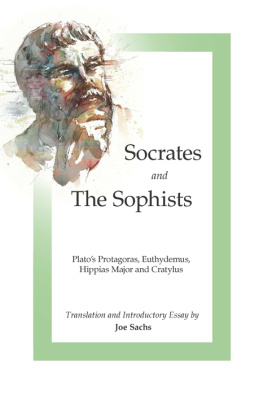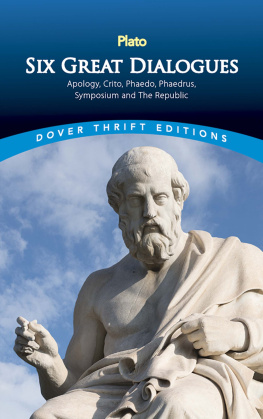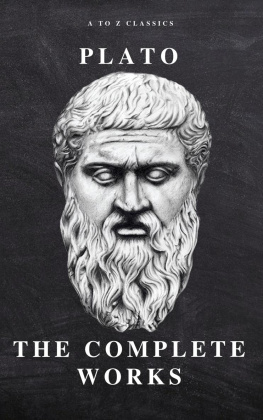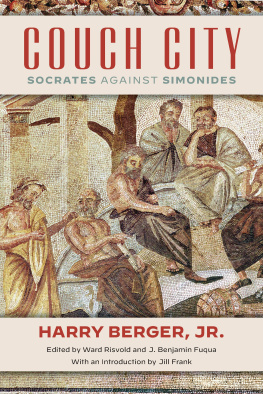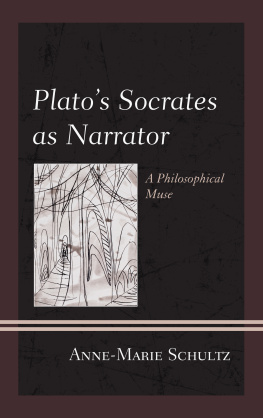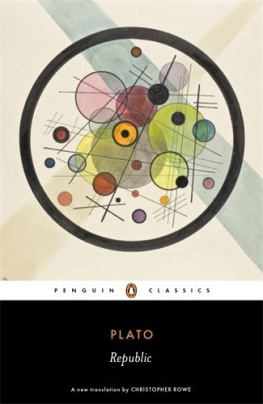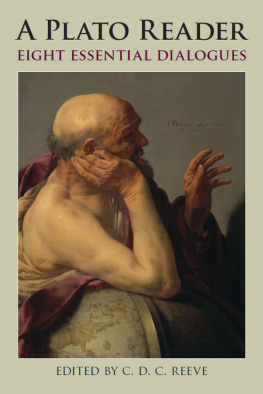Socrates
and
The Sophists
PLATOS PROTAGORAS, EUTHYDEMUS,
HIPPIAS MAJOR AND CRATYLUS
Translation and
Introductory Essay
Joe Sachs
ST. JOHNS COLLEGE, ANNAPOLIS
The Focus Philosophical Library
Aristotle: De Anima M. Shiffman
Aristotle: Nicomachean Ethics J. Sachs
Aristotle: Poetics J. Sachs
Athenian Funeral Orations J. Herrman
Descartes: Discourse on Method R. Kennington
Empire and the Ends of Politics (Plato/Pericles) S. D. Collins and D. Stauffer
Four Island Utopias (Plato, Euhemeros, Iambolous, Bacon) D. Clay and A. Purvis
Hegel: The Philosophy of Right A. White
Liberty, Equality & Modern Constitutionalism, Volume I G. Anastaplo
Liberty, Equality & Modern Constitutionalism, Volume II G. Anastaplo
Lucretius: On the Nature of Things W. Englert
Plato and Xenophon: Apologies M. Kremer
Plato: Euthydemus M. Nichols
Plato: Gorgias J. Arieti and R. Barrus
Plato: Gorgias and Aristotle: Rhetoric J. Sachs
Plato: Meno G. Anastaplo and L. Berns
Plato: Parmenides A. K. Whitaker
Plato: Phaedo E. Brann, P. Kalkavage, and E. Salem
Plato: Phaedrus S. Scully
Plato: Republic J. Sachs
Plato: Sophist E. Brann, P. Kalkavage, and E. Salem
Plato: Statesman E. Brann, P. Kalkavage, and E. Salem
Plato: Symposium A. Sharon
Plato: Theatetus J. Sachs
Plato: Timaeus P. Kalkavage
Socrates and Alcibiades: Four Texts D. Johnson
Socrates and the Sophists J. Sachs
Spinoza: Theologico-Political Treatise M. Yaffe
Socrates and the Sophists
2011 by Joe Sachs
Previously published by Focus Publishing/R. Pullins Company
Focus Publishing: An Imprint of Hackett Publishing Company
PO Box 44937
Indianapolis, Indiana 46244-0937
www.hackettpublishing.com
Cover illustration David Graves, www.davidgraves.cc. Depicts Protagoras in an uncharacteristic pause for thought, occasioned by his encounter with Socrates.
ISBN: 978-1-58510-568-7
Also available in paperback (ISBN 978-1-58510-362-1). Some content that appears in the print edition may not be available in other formats.
All rights are reserved.
Last updated May 2012
Our word sophist comes from the Greek sophists, which should, from its structure and parts alone, refer to someone distinguished for wisdom, and it appears to have started out with just that meaning. Its earliest uses noted in the standard lexicon are applied to poets and musicians of unusual skill and political leaders outstanding for their sagacity. By the time Plato was writing, though, the word could no longer be assumed to convey anything positive. Anytus, a politician who makes a brief appearance in the Meno, knows sophists only by reputation, but considers them a public disgrace (91C, 92B), and a slave who opens a door in the Protagoras, and who has first-hand experience of three of them, greets the arrival of two more presumed members of that species with a noise of disgust (314D). In Aristophanes play the Clouds, they are caricatured as buffoons who worship nebulous new deities, profess to know absurd and useless things, and teach the young disrespect for their elders. That caricature is embodied in the person of Socrates, but in the Protagoras (312A) Socrates himself asks a young man if he wouldnt be ashamed to end up called a sophist, and the sheepish reply is accompanied by a blush. It did not take long for those who had staked a claim to the name of sophist to turn a word originally intended to confer honor into a reproach, at least among many of their contemporaries, and at least in Athens. There are two ways to look at this decline in reputation. It may be simply a matter of fact that the people who became associated with the name of sophists did not do credit to it. Or it may be that there is something inherently disturbing in the original notion behind the name.
If we think of the sophist as a professional at the business of being wise, someone who turns his reputation for wisdom into a source of income, it will not be surprising if doubts about his motives begin to arise. More questionable than that, though, is the very possibility of making a specialty out of wisdom, whatever ones reasons for doing so might be. There was an American comedian who called himself Professor Irwin Corey, the worlds leading authority, to get a laugh before he even walked onto the stage. Mastery of any skill or subject matter depends upon an application of effort that would seem to require the sacrifice of other accomplishments, and those who have mastered them, and hire out their services to train others, can be judged by visible results. Those who hired the sophists to teach their children must have been looking for something more than specialized knowledge and specialized skills; they must have been looking for an education. Deciding whether or not to pursue any particular specialty, and understanding how to put one to use, would seem to depend on a deeper kind of learning, one that aims at the whole development of a human being. If, in place of or in addition to specialized learning, the sophists claimed to provide learning of this universal kind, then the one result they were promising was to make their students better people. And the same relation the word for education (paideia) had to the particular kinds of learning, the word virtue (aret) had to the particular merits a human being might have. Hence the question that happens to be on the tip of Menos tongue in the dialogue named for him, which pops out of his mouth before he even says hello to Socrates, became a standard topic of discussion: can virtue be taught? And assuming it can, is the virtue of their children and citizens something that parents and cities should turn over to outside experts?
The innocent-appearing word that associated someone with wisdom, then, turns out to open up the practical matter of how people should be educated and how their lives should be lived. When anything having to do with sophists comes up in Platos dialogues, that is the direction in which Socrates turns the conversation. So one might imagine that a dialogue called the Sophist would address those concerns directly and extensively, but one would be mistaken. In that dialogue it is Socrates who brings up the question of what a sophist is, but he is a silent listener to the discussion that ensues, and that discussion ends up inquiring not into practical matters of life and happiness, but into ultimate theoretical questions about the way the world is constituted. A series of attempts to define the sophist leads to a need to justify the possibility of speaking and thinking falsely, and then in turn to understand how there can be images of things that are. The participants in the discussion are a visiting philosopher from the home of Parmenides and a young Athenian with a gift for mathematics, and their conversation leaves the concerns of sophists and those who hire them far behind. To get a first-hand look at sophists in Platos dialogues and to see what Socrates makes of them, one must turn from the Sophist to other texts. In the Protagoras, the Euthydemus, and the Hippias Major, sophists of various kinds are on display, and they have to back up the things they say in discussion with Socrates. And in the Cratylus, the question of whether names are natural or conventional is framed by Socrates against a backdrop of the beliefs of two prominent sophists, as though an investigation of naming might provide a test of some kind for those beliefs; and by singling out and linking those beliefs, the Cratylus may indirectly shed light on the general question of what a sophist is.
The discussion in the Sophist runs into two problems in attempting to take on that question in its generality. What the sophist does is shrouded in darkness (254A), and what he is presents a variety of shifting or conflicting appearances (223C). Those appearances lead to seven definitions in the
Next page
